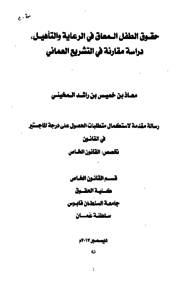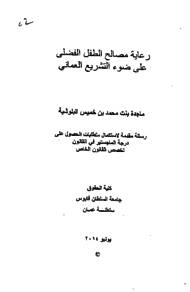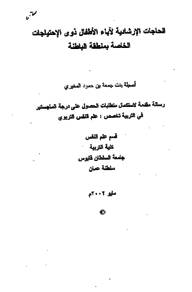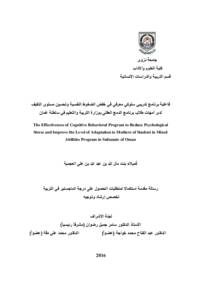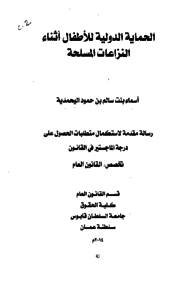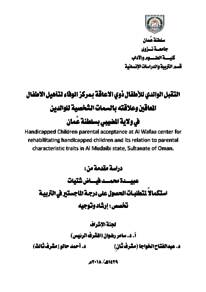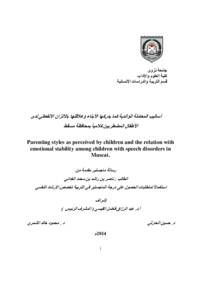وثيقة
حقوق الطفل المعاق في الرعاية والتأهيل : دراسة مقارنة في التشريع العماني.
الناشر
جامعة السلطان قابوس
ميلادي
2013
اللغة
العربية
الموضوع
الملخص الإنجليزي
Islamic law provisions directed in many scripts for the care and welfare of the class of children, weak and vulnerable people and towards helping the needy. This led to the establishment of the rules of jurisprudence in this respect based on facilitation, easement, and simplification. Likewise, international conventions related to the care of children, and the rights of people with disabilities are established on the same foundations to be later ratified by many States and adapted it in its legislations. Whereas, the question here is, was the practical side of the application of these rights achieved? This study came to answer this question and the results are as follows:
1. The study concluded that the most prominent feature that must be available within the rights of a disabled children, to allow a broader benefit for all children on a global level, without discrimination is "the feature of universality". In order to facilitate the application of law provisions for everyone without discrimination. This feature is exclusively present in the Islamic law, as its provisions apply to everyone, without requiring ratification as the case with treaties or nationality, as found in the national legislation.
2. Many States now exhibit a sense of shame towards disabled child as is the case with some families. Keeping the disabled child away from the community is a sign of such families and lack of accurate data and statistics is the sign of such State. This kind of tendency is reflected negatively on the care and rehabilitation of the disabled child and increases the severity of the disability. Consequently, the child will continue to be observed as a burden on the family and State. Such matter must be brought to attention.
3. Legislative loopholes and the variation in the distribution of basic services such as education and health are a clear evidence of the lack of a comprehensive approach to ensure the accurate realization of the rights and welfare of the disabled child. In the absence of such an approach there will be no tangible progress.
المجموعة
URL المصدر
الملخص العربي
خصت كثير من نصوص الشريعة الاسلامية فئة الأطفال والضعفاء والمحتاجين بالمساعدة ومد يد العون لهم؛ فكان أن أستنبطت القواعد الفقهية المبنية على التيسير، والترخيص، والتوسعة، ورفع الحرج عنهم. ثم أتت الاتفاقيات الدولية للطفل، وحقوق الأشخاص ذوي الإعاقة لتبني على شيء من هذه الأسس. ثم صدقتها فيما بعد الدول ونثرتها في تشريعاتها. لكن هل نال الجانب التطبيقي القدر الكافي من هذه الحقوق؟ هذا ما سعت إليه الدراسة لمعرفته؛ فخرجت بنتائج من أهمها:
۱- حقوق الطفل المعاق محل اتفاق من الجميع فوجب أن تتسم بسمة العالمية؛ لتنطبق أحكامها على الجميع دون تمييز أو تفرقة. وهذا ما تفردت به الشريعة الإسلامية دون سواها، فأحكامها المتعلقة بحقوق الطفل المعاق موجهة للكافة.
٢- الأسرة التي تخفي طفلها المعاق من الظهور في المجتمع؛ دليل على شعورها بالخزي تجاهه، والدولة التي لا توجد لديها قاعدة بيانات دقيقة عن هذه الفئة، أو أنها تخفيها؛ دليل على وجود ذات الشعور لديها، وليس ذلك بحل، إنما هو ظلم ذوي القربي يضاف إلى معاناتهم التي لم تكن باختيارهم.
٣- الفجوات التشريعية، والتباين في توزيع الخدمات الأساسية كالتعليم والصحة دليل على عدم وجود منهج حقوقي شامل، ويكون ذلك فلن يكون هناك أي تقدم ملموس في رعاية وتأهيل الطفل المعاق.
۱- حقوق الطفل المعاق محل اتفاق من الجميع فوجب أن تتسم بسمة العالمية؛ لتنطبق أحكامها على الجميع دون تمييز أو تفرقة. وهذا ما تفردت به الشريعة الإسلامية دون سواها، فأحكامها المتعلقة بحقوق الطفل المعاق موجهة للكافة.
٢- الأسرة التي تخفي طفلها المعاق من الظهور في المجتمع؛ دليل على شعورها بالخزي تجاهه، والدولة التي لا توجد لديها قاعدة بيانات دقيقة عن هذه الفئة، أو أنها تخفيها؛ دليل على وجود ذات الشعور لديها، وليس ذلك بحل، إنما هو ظلم ذوي القربي يضاف إلى معاناتهم التي لم تكن باختيارهم.
٣- الفجوات التشريعية، والتباين في توزيع الخدمات الأساسية كالتعليم والصحة دليل على عدم وجود منهج حقوقي شامل، ويكون ذلك فلن يكون هناك أي تقدم ملموس في رعاية وتأهيل الطفل المعاق.
قالب العنصر
الرسائل والأطروحات الجامعية

